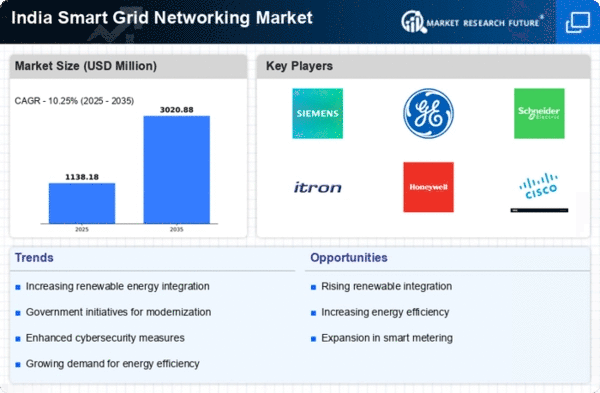Focus on Energy Efficiency
Energy efficiency has become a critical focus area for India, particularly in the context of climate change and sustainable development. The smart grid-networking market is increasingly seen as a solution to enhance energy efficiency across various sectors. By leveraging advanced technologies such as demand response and energy storage, smart grids can optimize energy usage and reduce wastage. The Bureau of Energy Efficiency in India has been promoting initiatives that encourage the adoption of energy-efficient practices, which could potentially lead to a reduction in energy consumption by up to 20%. This emphasis on energy efficiency is likely to propel the smart grid-networking market forward, as stakeholders seek to implement solutions that align with national energy goals.
Rising Demand for Electricity
India's rapidly growing population and urbanization are leading to an unprecedented increase in electricity demand. The smart grid-networking market is poised to benefit from this trend, as the current infrastructure struggles to meet the rising needs. According to estimates, electricity demand in India is projected to grow by approximately 6-8% annually. This surge necessitates the implementation of smart grid technologies that can optimize energy distribution and reduce losses. By integrating advanced metering and real-time monitoring, the smart grid can enhance operational efficiency and reliability. Consequently, the rising demand for electricity serves as a significant driver for the smart grid-networking market, pushing stakeholders to invest in innovative solutions.
Government Initiatives and Policies
The Indian government has been actively promoting the development of the Smart Grid Networking Market through various initiatives and policies. Programs such as the National Smart Grid Mission aim to enhance the efficiency and reliability of the power sector. The government has allocated substantial funding, with an estimated $1.5 billion earmarked for smart grid projects over the next few years. These initiatives not only facilitate the modernization of the existing grid infrastructure but also encourage private sector participation. The regulatory framework is evolving to support innovative technologies, which is likely to drive growth in the smart grid-networking market. Furthermore, the push for energy security and sustainability aligns with global trends, making India a focal point for smart grid advancements.
Increased Private Sector Participation
The smart grid-networking market in India is witnessing a notable increase in private sector participation, which is driving innovation and investment. With the liberalization of the energy sector, private companies are now more inclined to invest in smart grid technologies. This trend is supported by favorable policies and incentives from the government, which aim to attract private investments. As of 2025, private investments in the energy sector are projected to reach approximately $20 billion, with a significant portion directed towards smart grid initiatives. This influx of capital and expertise from the private sector is likely to enhance the development and deployment of smart grid solutions, thereby accelerating growth in the smart grid-networking market.
Integration of Smart Metering Solutions
The integration of smart metering solutions is transforming the landscape of the smart grid-networking market in India. Smart meters facilitate real-time data collection and analysis, enabling utilities to monitor consumption patterns and manage resources more effectively. The Indian government has set ambitious targets for smart meter installations, aiming for over 250 million smart meters by 2025. This initiative is expected to enhance billing accuracy, reduce operational costs, and empower consumers with better energy management tools. As a result, the proliferation of smart metering solutions is likely to drive significant growth in the smart grid-networking market, fostering a more efficient and transparent energy ecosystem.

















